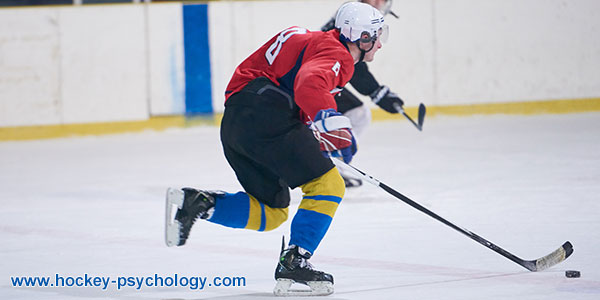How to Play For YOURSELF in Hockey
Do you worry about what others think of you?
Does positive feedback from others boost your confidence?
Do others have to say you’re doing a good job for you to actually believe you’re playing well?
If so, a fragile self-confidence and social approval might be hurting your game.
I worked with an athlete once whose confidence was on a constant roller coaster…
This player was typically consistent in their play, but if their coach and teammates didn’t acknowledge their efforts and success, it’s like it didn’t exist.
After this player’s achievement went “unnoticed,” his confidence slowly dwindled down until the belief in his ability was almost gone completely.
You could see it in his body language; his head was down, his shoulders slouched, a stoic look on his face, and he moved slowly.
One day I asked him why he gets so down even when he’s having a pretty good game…
He told me because his coach and teammates don’t see him or tell him he’s doing a good job. He likes to hear their feedback. It makes him play better, he said.
This player told me that when he gets that positive response, it makes him feel good about what he’s doing. If he doesn’t hear anything encouraging, he thinks he did something wrong and his confidence takes a slight hit.
Through my Coaching Years, I’ve had Other Athletes like this…
After they did something well, they would look to the sideline for a response from their coach or look to the stands for positive feedback from their parents. If they didn’t get it, it was as if they saw themselves as displeasing.
Many athletes are similar. They seek the approval of others and if they don’t seem to receive it, their confidence drops and they feel pressure to perform “better,” in a way that impresses others.
The Flyers’ goalie, Carter Hart has a more logical view on the thoughts of others. He says:
“It’s cool to see the support that you get, but at the same time those are just people’s opinions. For sure, it’s good to hear that stuff, but you can’t let it get to your head…”
“It’s what YOU think. It doesn’t really matter what other people are saying or what they’re thinking.”
Ron Hextall, the Flyers’ general manager says that Hart is a “prime example” of what you want young players to accomplish.
During the season, Hart doesn’t follow his statistics, he deletes every social-media app from his phone, and he doesn’t let people or goals bother him.
Carter Hart put up his best numbers yet this past season and became the only three-time winner of the Del Wilson Trophy, which is awarded to the WHL’s best goalie.
When he finally saw his stats, he said, “I thought it was okay.”
Hart recorded the statistics he did in this last season because he was playing for himself. No one else or their opinions mattered to him, and therefore, his confidence remained unwavering.
As an athlete, you want to play freely and for yourself.
You want to seek your own approval. Like Carter expressed, all that matters is what YOU think.
Also, you want to build your confidence before a game and maintain that same level of confidence throughout.
Your confidence is YOUR responsibility and you want to keep it that way.
Related Articles on Hockey Mental Game:
- How to Create a Winning Mindset for Hockey
- Mental Keys to Recovery for Hockey Players
- How Hockey Players Grow into Their Potential
*Subscribe to The Sports Psychology Podcast on iTunes
*Subscribe to The Sports Psychology Podcast on Spotify
Mental Coaching Programs for Hockey
Our mental game coaching programs for hockey players helps athletes improve confidence, concentration, let go of errors quickly, and stay composed during crunch-time. Read more about sports psychology for hockey players at Peaksports.com
Please contact me by phone at 888-742-7225 or by filling out the webform below to learn more about our personal mental training programs for hockey players or teams:

Leave a Reply